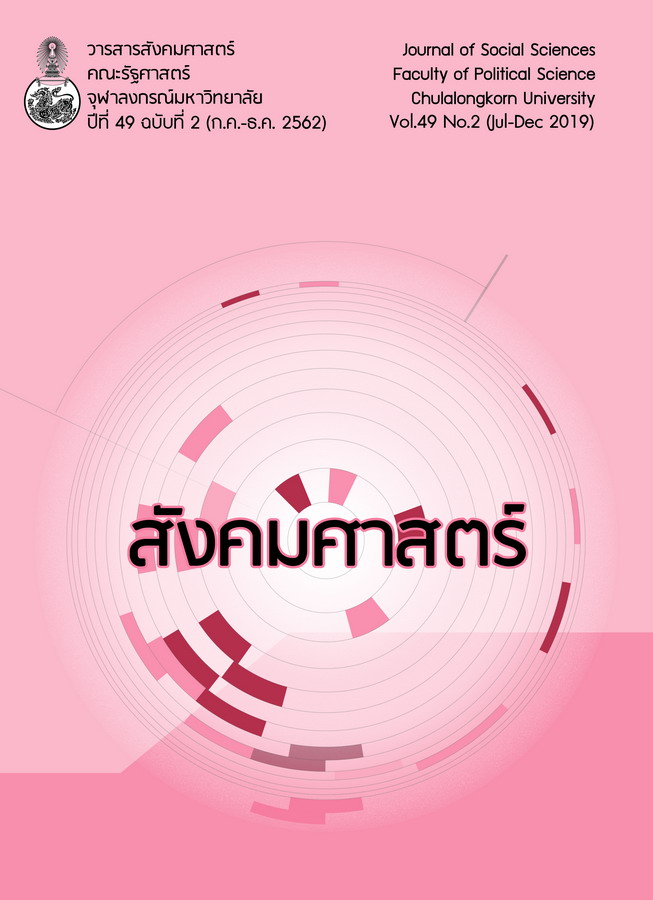อิสรภาพจากมโนทัศน์ทายาทความรุนแรง
DOI:
https://doi.org/10.61462/cujss.v49i2.728คำสำคัญ:
ทายาทความรุนแรง, การสืบทอด/การผลิตซ้ำความรุนแรง, อิสรภาพจากมโนทัศน์ทายาทความรุนแรง, การเสริมสร้างพลังของตนเองบทคัดย่อ
มนุษย์เกิดมาพร้อมกับ “เจตจำนงเสรี” (free will) กล่าวคือ มนุษย์มีเสรีภาพในการตัดสินใจเลือกที่จะกระทำหรือไม่กระทำการสิ่งใดก็ได้บนเส้นทางชีวิตของตน แต่อย่างไรก็ตาม ยังมีอีกหลายอย่างซึ่งถือได้ว่าอยู่เหนือความสามารถในการเลือกของมนุษย์ หนึ่งในนั้นก็คือ “จุดเริ่มต้นแห่งชีวิต” หรือเราปราศจากเสรีภาพในการเลือกสภาพครอบครัวตั้งต้นของตนได้ แต่ครอบครัวนั้นกลับเป็นสถาบันทางสังคมที่มีความสำคัญและมีอิทธิพลอย่างยิ่งต่อการดำเนินชีวิตของมนุษย์ทั้งชีวิต หากสถาบันพื้นฐานแห่งชีวิตและสังคมทำหน้าที่บกพร่องหรือรุนแรง แน่นอนว่าย่อมส่งผลกระทบต่อสถาบันทางสังคมอื่นอย่างหลีกเลี่ยงไม่ได้ การศึกษานี้พบว่า ทฤษฎีทางสังคมวิทยาแบบดั้งเดิมที่กล่าวถึงการสืบทอดหรือการผลิตซ้ำความรุนแรง (reproduction of violence) ถูกทำให้มีน้ำหนักลดลงด้วยอิทธิพลของการเปลี่ยนแปลงเชิงโครงสร้างและบริบททางสังคมใน “ยุคหลังสังคม” (post-societal phase) โดยบทความนี้จะสะท้อนให้เห็นว่าแท้ที่จริงแล้วมนุษย์สามารถปลดปล่อยตัวเองออกจาก “มโนทัศน์ทายาทความรุนแรง” ซึ่งถูกปลูกฝังมาจากประสบการณ์ความรุนแรงในวัยเด็กได้ ไม่ว่าผู้นั้นจะเผชิญกับสถานการณ์เยี่ยงไรก็ตาม ทั้งนี้เนื่องจากมนุษย์เสมือนผลผลิตทางสังคมซึ่งมาพร้อมกับเมล็ดพันธุ์แห่งคุณค่าที่ทรงพลัง มีศักยภาพในการเปลี่ยนแปลงตนเองและมีความสามารถในการสร้างสรรค์สังคมไปในวิถีทางที่ดีขึ้นต่อไปได้
Downloads
เอกสารอ้างอิง
Burawoy, Michael. 2005. “For Public Sociology.” American Sociological Review 70(4): 4–28.
Chetta Puanghut. 2007. “Trisadee Sangkhom Lae Kantumkramkoijai Sapava Samaimai Khong Anthony Giddens.” [Anthony Giddens’ Sociological Theories and Understanding Social Context]. Rom Phruek Journal 26(1): 1-42. (in Thai)
The Childhood Domestic Violence Association. 2017. “Are You a Child or Teen Experiencing Childhood Domestic Violence?" Accessed August 31, 2017. https://cdv.org/what-is-cdv/i-am-a-child-experiencing-cdv.
Crawford, Emma, Helen Liebling-Kalifani, and Vicki Hill. 2009. “Women’s Understanding of the Effects of Domestic Abuse: The Impact on Third Identity, Sense of Self and Resilience.
A Grounded Theory Approach.” Journal of International Women's Studies 11(2): 62-82.
Finley, Laura L. 2016. Domestic Abuse and Sexual Assault in Popular Culture. Santa Barbara, CA: ABC-CLIO
Forward, Susan, and Craig Buck. 2001. Toxic Parents: Overcoming Their Hurtful Legacy and Reclaiming Your Life. New York: Bantam Books.
Fosha, Diana. 2000. The Transforming Power of Affect: A Model for Accelerated Change. New York: Basic Books.
Leisenring, Amy. 2006. “Confronting Victim Discourses: The Identity Work of Battered Women." Symbolic Interaction 29(3): 307-330.
McClennen, Joan. 2010. Social Work and Family Violence: Theories, Assessment, and Intervention. New York: Springer Publishing Company.
McGraw, Phill. 2017a. "End the Silence on Domestic Violence." Dr. Phill Show. Accessed December 27, 2017. https://www.drphil.com/show-pages/end_the_silence.
-----. 2017b. “Parenting.” Dr. Phill Show. Accessed December 22, 2017.
https://www.drphil.com/advice_categories/parenting.
-----. 2016. “What Parents Fighting Looks Like through Their Child’s Eyes.”Dr. Phill Show. Accessed January 17, 2018. https://www.drphil.com/advice/what-parents-fighting-looks-like-through-their-childs-eyes.
Osteen, Joel. 2017a. “Don't Waste Your Pain.” Joel Osteen Ministries. Accessed August 27, 2017.
https://www.joelosteen.com/Pages/WatchOnline.aspx.
-----. 2017b. “From Victim to Victor.” Joel Osteen Ministries. Accessed August 23, 2017.
https://www.joelosteen.com/Pages/MonthlyOffer.aspx?variantId=76.
Pinwadee Srisupun. 2012. “Bot Vichan Nangsue: Rob Stones. Structuration Theory.” [Book Review: Rob Stones. Structuration Theory].Journal of Mekong Societies 8(3):192-200. (in Thai)
Reef, Sharon. 2004. Believe in Your Self: An Ancient Sage in a Modern World: A Simple and Practical Guide to Bringing Spirituality into Daily Life. San Diego, CA: International University Line.
Schacter, Daniel L. 2011. Psychology. 2nd ed. New York: Worth Publishers.
Stones, Rob. 2005. Structuration Theory. New York: Palgrave MacMillan.
Supang Chantavanich. 2012. Trisadee Sangkhom Wittaya. [SociologicalTheories]. 7th ed. Bangkok: Chulalongkorn University Press. (in Thai)
Tippawan Hansakunachai. 2015. “Samongdek Reanrue Dai Mak Kwa Tee Por Mae Khid." [Children’s Brain Could Learn Much More Than What Parents Think]. Manager Online. Accessed January 26, 2018. http://www.manager.co.th/goodhealth/ViewNews.aspx? NewsID=9580000095049. (in Thai)
Widom, Cathy Spatz, Sally Czaja, and Mary Ann Dutton. 2014. “Child Abuse and Neglect and Intimate Partner Violence Victimization and Perpetration: A Prospective Investigation.” Child Abuse & Neglect 38(4): 650-663.
Winfrey, Oprah. 2017. "Oprah's Lifeclass." The Oprah Winfrey Network. Accessed December 27, 2017. http://www.oprah.com/app/oprahs-lifeclass.html.
-----. 2015. "The Oprah Winfrey Show, Aha! 20 Years of Lessons." Youtube. Accessed January 14, 2018.
https://www.youtube.com/watch?v=NC6sirSLCsk&t=2058s.
-----. 2016. "SuperSoul Sunday." The Oprah Winfrey Network. Accessed September 22, 2017.
http://www.oprah.com/app/super-soul-sunday.html.
World Health Organization. 2017. The Ecological Framework. Geneva: The Organization. Accessed August 14, 2018. http://www.who.int/violenceprevention/approach/ecology/en.
Wolford, Anna. 2015. Multicultural Education: Teaching and Learning in the Global Village. San Diego, CA: Cognella Academic Publishing.
Zimmerman, Marc A. 1995. “Psychological Empowerment: Issues and Illustrations.” American Journal of Community Psychology 23(5): 581-599.
ดาวน์โหลด
เผยแพร่แล้ว
รูปแบบการอ้างอิง
ฉบับ
ประเภทบทความ
สัญญาอนุญาต
ลิขสิทธิ์ (c) 2019 คณะรัฐศาสตร์ จุฬาลงกรณ์มหาวิทยาลัย

อนุญาตภายใต้เงื่อนไข Creative Commons Attribution-NonCommercial-NoDerivatives 4.0 International License.
เงื่อนไขการอนุญาตสาธารณะ
นโยบายลิขสิทธิ์และการอนุญาต
วารสารสังคมศาสตร์ จุฬาลงกรณ์มหาวิทยาลัย เผยแพร่เนื้อหาทั้งหมดภายใต้ สัญญาอนุญาตครีเอทีฟคอมมอนส์แบบแสดงที่มา-ไม่ใช้เพื่อการค้า-ไม่ดัดแปลง 4.0 นานาชาติ (CC BY-NC-ND 4.0)
ลิขสิทธิ์
บทความทั้งหมดที่ตีพิมพ์ในวารสารสังคมศาสตร์ จุฬาลงกรณ์มหาวิทยาลัย เป็นลิขสิทธิ์ของ คณะรัฐศาสตร์ จุฬาลงกรณ์มหาวิทยาลัย ผู้เขียนจะโอนสิทธิ์ทั้งหมดให้แก่วารสารเมื่อบทความได้รับการตอบรับให้ตีพิมพ์
สัญญาอนุญาต CC BY-NC-ND 4.0
ภายใต้สัญญาอนุญาตนี้:
-
แสดงที่มา (BY): ผู้ใช้ต้องแสดงที่มาโดยอ้างอิงถึงผู้เขียน คณะรัฐศาสตร์ จุฬาลงกรณ์มหาวิทยาลัย และวารสารสังคมศาสตร์ จุฬาลงกรณ์มหาวิทยาลัย พร้อมทั้งให้ลิงก์ไปยังสัญญาอนุญาต และระบุหากมีการเปลี่ยนแปลง ทั้งนี้สามารถทำได้ในลักษณะที่สมเหตุสมผล แต่ต้องไม่ทำในลักษณะที่แสดงว่าผู้อนุญาตให้การรับรองผู้ใช้หรือการใช้งานดังกล่าว
-
ไม่ใช้เพื่อการค้า (NC): ผู้ใช้ไม่สามารถใช้เนื้อหาเพื่อวัตถุประสงค์ทางการค้า การใช้งานเชิงพาณิชย์จะต้องได้รับอนุญาตเป็นลายลักษณ์อักษรล่วงหน้าจากผู้เขียนและคณะรัฐศาสตร์ จุฬาลงกรณ์มหาวิทยาลัย
-
ไม่ดัดแปลง (ND): หากผู้ใช้นำเนื้อหาไปรวม ดัดแปลง หรือต่อยอด ผู้ใช้ไม่สามารถเผยแพร่งานที่ดัดแปลงนั้นได้ การดัดแปลงผลงานจะต้องได้รับอนุญาตเป็นลายลักษณ์อักษรล่วงหน้าจากผู้เขียนและคณะรัฐศาสตร์ จุฬาลงกรณ์มหาวิทยาลัย
นโยบายการเข้าถึงแบบเปิด
วารสารสังคมศาสตร์ จุฬาลงกรณ์มหาวิทยาลัย ให้การเข้าถึงเนื้อหาแบบเปิดโดยทันทีตามหลักการที่ว่าการทำให้งานวิจัยสามารถเข้าถึงได้อย่างเสรีแก่สาธารณะจะสนับสนุนการแลกเปลี่ยนความรู้ในระดับโลก ผู้ใช้สามารถอ่าน ดาวน์โหลด คัดลอก เผยแพร่ พิมพ์ ค้นหา หรือเชื่อมโยงไปยังเนื้อหาฉบับเต็มของบทความได้โดยไม่ต้องขออนุญาตล่วงหน้าจากผู้จัดพิมพ์หรือผู้เขียน ทั้งนี้เป็นไปตามสัญญาอนุญาต CC BY-NC-ND 4.0
นโยบายการเก็บบันทึกด้วยตนเอง
ผู้เขียนสามารถเก็บบันทึกบทความฉบับตีพิมพ์สุดท้าย ต้นฉบับที่ส่ง (preprint) หรือฉบับที่ผ่านการประเมิน (postprint) ในคลังสถาบันหรือเว็บไซต์ส่วนตัวได้ โดยต้องมีการอ้างอิงการตีพิมพ์ครั้งแรกในวารสารสังคมศาสตร์ จุฬาลงกรณ์มหาวิทยาลัย พร้อมระบุแหล่งอ้างอิงที่สมบูรณ์และลิงก์ไปยังเว็บไซต์ของวารสาร
การขออนุญาต
สำหรับการใช้งานนอกเหนือจากที่ครอบคลุมโดยสัญญาอนุญาต CC BY-NC-ND 4.0 กรุณาติดต่อ:
กองบรรณาธิการ
วารสารสังคมศาสตร์ จุฬาลงกรณ์มหาวิทยาลัย
คณะรัฐศาสตร์ จุฬาลงกรณ์มหาวิทยาลัย
Email: cusocscij@gmail.com
สำหรับข้อมูลเพิ่มเติมเกี่ยวกับสัญญาอนุญาตครีเอทีฟคอมมอนส์แบบแสดงที่มา-ไม่ใช้เพื่อการค้า-ไม่ดัดแปลง 4.0 นานาชาติ กรุณาเยี่ยมชม: https://creativecommons.org/licenses/by-nc-nd/4.0/deed.th





